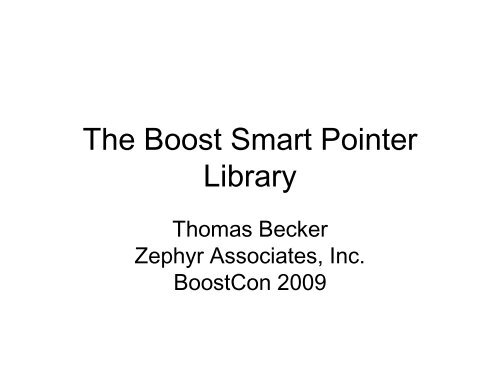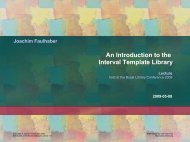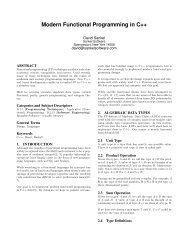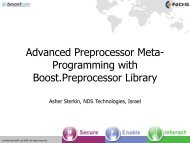dangling pointer
dangling pointer
dangling pointer
- No tags were found...
You also want an ePaper? Increase the reach of your titles
YUMPU automatically turns print PDFs into web optimized ePapers that Google loves.
The Boost Smart PointerLibraryThomas BeckerZephyr Associates, Inc.BoostCon 2009
OverviewFirst two sentences of the Boost Smart Pointer Library documentation:Smart <strong>pointer</strong>s are objects which store <strong>pointer</strong>s to dynamically allocated (heap)objects.They behave much like built-in C++ <strong>pointer</strong>s except that they automatically deletethe object pointed to at the appropriate time.
Contents of the Boost Smart Pointer LibraryContents of the Boost smart <strong>pointer</strong> library (slightly augmented):shared_ptrshared_arrayscoped_ptrscoped_arrayweak_ptrintrusive_ptrstd:: auto_ptr (soon-to-be unique_ptr)Object ownership shared amongmultiple <strong>pointer</strong>sArray ownership shared amongmultiple <strong>pointer</strong>sSimple sole ownership of single objects(non-copyable)Simple sole ownership of arrays (noncopyable)Non-owning observers of an objectowned by shared_ptrShared ownership of objects with anembedded reference counttransferrable unique ownership
A Bit of History (Do Not Repeat)In the 1990’s, the definition of a smart <strong>pointer</strong> was: any class that overloadsoperator*, operator->, operator++, and operator-- to do anything.Anything at all.The cardinal sin of 1990’s style OO programming: confusing encapsulation withobfuscation.We have since learned: If it’s called a <strong>pointer</strong> and looks like a <strong>pointer</strong>, then itbetter be a <strong>pointer</strong>, and the operators better behave like they do on “real”<strong>pointer</strong>s.Overloading operators *, ->, ++, and -- has found its place in the world ofiterators.The iterator concept is an abstraction of the <strong>pointer</strong> concept with the addition ofan underlying sequence —concrete or abstract—that the iterator traverses.Here, the operators *, ->, ++, and – are overloaded to do what the iterator, by itsnature, needs to do. That’s expressive, as opposed to obfuscating.
The ProblemTraditional “management” of dynamically allocated memory in C++:X* p = new X;// use p, pass it around to other parts of the program// somewhere, sometime, somebody doesdelete p;Common Problems:1) Deletion happens too early. Someone’s still holding a copy of p anddereferences it: <strong>dangling</strong> <strong>pointer</strong>.2) Deletion happens too late, or not at all: memory leak.
oost::shared_ptr savesAvoid <strong>dangling</strong> <strong>pointer</strong>s and memory leaks using boost:shared_ptr:boost::shared_ptr sp(new X);// use sp, pass it around to other parts of the program// under the hood, the destructor of the last copy of sp// that goes out of scope calls delete on the raw <strong>pointer</strong>.Deletion happens not too early, not to late.In particular, this gives us all the benefits of RAII (think exceptions and multiplereturn statements).Under the hood, boost::shared_ptr uses a reference count that is sharedamong all copies of a shared_ptr object.
Null PointersC/C++ raw <strong>pointer</strong>s have a “built-in boolean”:X* p = new X;// use p, perhaps pass it around// Conditionally delete and null pif(condition){delete p; // unless someone still has a copyp = NULL;}if(p){// use p}
oost::shared_ptr can be nulledNulling boost:shared_ptr:boost::shared_ptr sp(new X);// use sp, perhaps pass it aroundif(condition){// Null sp, delete memory unless there are other copiessp.reset();}// Conversion to bool yields false if sp was// default-constructed, or reset() has been called.if(sp){// use sp}
Reassigning a shared_ptrboost::shared_ptr sp(new X);// use sp, perhaps pass it around// Put sp in charge of a new X object, delete old X unless// there are other copiessp.reset(new X);// The two resets are more efficient and concise versions// of:sp = boost::shared_ptr();sp = boost::shared_ptr(new X);
Pragmatism FirstThere are two member functions in boost:shared_ptr that are somewhatcontroversial: pragmatists like them, purists don’t.boost::shared_ptr sp(new X);// use sp, pass it around to other parts of the program// How many copies are out there?long num_copies = sp.use_count();// Am I the only one?if(sp.unique()){// …}Use boost::shared_ptr::use_count() only for debugging purposes.Understand that boost::shared_ptr::use_count() gets tricky to use in thepresence of concurrency.
Pragmatism First (cont.)boost::shared_ptr sp(new X);// Get the raw <strong>pointer</strong>X* p = sp.get();Use boost::shared_ptr::get() only to pass the raw <strong>pointer</strong> tolibrary/system functions that expect a <strong>pointer</strong> and do not take ownership of the<strong>pointer</strong>.
Custom Deleterboost:shared_ptr works with custom memory allocators.Suppose you want to allocate objects of type X from a special, optimized heap.// Gets memory from a custom heap and constructs an X at// that location with placement new.X* custom_allocate_x();// Destructs the X and releases the memorycustom_deallocate_x(X* p);You can now shield clients from the details of your allocation strategy with afactory function that returns a boost::shared_ptr.boost::shared_ptr make_x(){return boost::shared_ptr(custom_allocate_x(), &custom_deallocate_x);}
Handling HandlesCustom deleters can be used to manage things such as operating systemhandles and descriptors.// Win32 mutex handle managed by a boost::shared_ptr// A Win32 HANDLE is a void*boost::shared_ptr hMutex(::CreateMutex(NULL, TRUE, NULL),&CloseHandle);if(! hMutex){throw processKaputt;}
oost::shared_ptr and Incomplete Typesclass SafeHiddenImplClass;boost::shared_ptrcreateSafeHiddenImpl();{boost::shared_ptr ssp =createSafeHiddenImpl();} // fine: deletion is deferred to the ref count objectclass SafeHiddenImplClass {public:~SafeHiddenImplClass() {/*…*/}};boost::shared_ptrcreateSafeHiddenImpl(){return boost::shared_ptr(new SafeHiddenImplClass);}
Leaking Memory with Smart PointersTrue or false: If every occurrence of new in my program is in the constructor of aboost:shared_ptr, as inBoost::shared_ptr sp(new X);then my program cannot leak memory.There are two ways for memory leaks to occur.Big fat false
Non-Exception-Safe Function Callsvoid f(boost::shared_ptr, int);int g();// Good codeboost::shared_ptr sp(new X);f(sp, g());// Bad code//// Problem if new X is evaluated first, then g(), and g()// throws.f(boost::shared_ptr(new X), g());Moral: avoid using unnamed temporaries of type boost::shared_ptr.
struct B;struct A {boost::shared_ptr m_spB;};struct B {boost::shared_ptr m_spA;};Cyclic References{}boost::shared_ptr spA(new A);boost::shared_ptr spB(new B);spA->m_spB = spB;spB->m_spA = spA;spA and spB keep each other alive forever.Later, we will see how boost::weak_ptr solves this problem.
Miscellaneous• boost:shared_ptr can be used in STL containers, including ordered ones.• boost::shared_ptr sp(new X);is ok if X* converts to Y*.• Conversions between raw <strong>pointer</strong>s propagate to boost::shared_ptr:If X* converts to Y*, then boost::shared_ptr converts toboost::shared_ptr.Similarly, explicit casts between raw <strong>pointer</strong>s translate to boost::shared_ptrvia free functions. For example:class Base{};class Derived : public base {};boost::shared_ptr spb(new Derived);boost::shared_ptr spd =boost::static_<strong>pointer</strong>_cast(spb);assert(spb == spd);
oost::shared_arrayIn C/C++, there are two versions of new/delete: one for objects, one for arrays.The <strong>pointer</strong>s returned by ordinary new and array new have the same type.Therefore, there is a separate version of boost::shared_ptr for arraynew/delete.boost::shared_array is boost::shared_ptr for array new/delete.boost::shared_array should be used very rarely, because:C-style array should be used very rarely! Use std::vector instead. In rarecases, you may want to use a boost::shared_ptr to an std::vector.
oost::scoped_ptr{boost::scoped_ptr scp(new X);// Use scp. You cannot make copies of scp, nor can you// pass the ownership of the X object to any other smart// <strong>pointer</strong>.}// When scp goes out of scope, the destructor calls// delete on the raw <strong>pointer</strong>.boost::shared_ptr is very simple. Pretty much the only non-trivial thing in itsinterface is the reset method.
oost::scoped_arrayboost::scoped_array is boost::scoped_ptr for array new/delete.boost::scoped_array should be used very rarely, because:C-style arrays should be used very rarely! Use std::vector instead.
Cyclic ReferencesRecall: cyclic references cause memory leaks even when usingboost::shared_ptr:struct B;struct A {boost::shared_ptr m_spB;};struct B {boost::shared_ptr m_spA;};boost::weak_ptr solves this problem (and others).
Cyclic References and SymmetryIn practice, there is always an asymmetry in situations with cyclic references.For example, a window may hold a <strong>pointer</strong> to child windows, and each childwindow may hold a back<strong>pointer</strong> to the window. But the ownership relation is fromparent to child.class window {std::list m_children;??? m_parent; // back<strong>pointer</strong> to parent, if any};What type would we use for the back<strong>pointer</strong>? boost::shared_ptr wouldcreate a cyclic dependency. Moreover, it expresses the wrong thing: the back<strong>pointer</strong> is just for access, not for ownership.Using a raw <strong>pointer</strong> wouldn’t be such a bad idea: no ownership implied.However, a raw <strong>pointer</strong> could be <strong>dangling</strong>, e.g., when the window gets unparented.A better solution is boost::weak_ptr.
Using boost::weak_ptrUse boost::weak_ptr to break cyclic dependencies:class window {std::list m_children;boost::weak_ptr m_parent;};Now the parent owns its children. A child can ask if it has a parent, and if so,access it.
oost::weak_ptr Creation and ResettingA boost::weak_ptr must be created from a boost::shared_ptr.boost::shared_ptr sp1(new X);// Construct a weak <strong>pointer</strong> that observes what sp points toboost::weak_ptr wp1(sp1);//// Alternatively, use assignmentboost::weak_ptr wp2; // null weak <strong>pointer</strong>wp2 = sp1;// A weak <strong>pointer</strong> can be reset to null:wp1.reset(); // Equivalent to wp1 = weak_ptr();// There is no reset that takes a weak <strong>pointer</strong> or shared// <strong>pointer</strong> as an argument. Use assignment instead:boost::shared_ptr sp2(new X);wp1 = sp2;wp2 = wp1;
oost::weak_ptr Object AccessRecall: a boost::weak_ptr must ask whether or not it’s <strong>dangling</strong> before it canbe dereferenced. This is achieved by getting a boost::shared_ptr from theweak <strong>pointer</strong>.color window::get_parent_bkgr_color(){// We may not have a parent anymoreboost::shared_ptr safe_parent = m_parent.lock();if (safe_parent) {return safe_parent->get_bkgr_color();}else {throw no_parent;}}
oost::weak_ptr Object Access (cont.)Alternatively, you can use a boost::shared_ptr constructor instead of theweak <strong>pointer</strong>’s lock() member.color window::get_parent_bkgr_color(){// We may not have a parent anymoretry{boost::shared_ptr safe_parent(m_parent);return safe_parent->get_bkgr_color();}catch(boost::bad_weak_ptr&) {throw no_parent;}}
oost::weak_ptr Thread SafetyThe fact that boost::weak_ptr uses a boost::shared_ptr to access theobject pointed to guarantees that the proper level of thread safety is maintained.color window::get_parent_bkgr_color(){// We may not have a parent anymoretry{// Getting the shared_ptr from the weak_ptr is a read// operation that is thread safe: other threads may// concurrently modify other shared_ptr or// weak_ptr objects that manage the same pointee.boost::shared_ptr safe_parent(m_parent);// Using safe_parent is safe no matter what other// threads do: we now have ownership of the pointee!return safe_parent->get_bkgr_color();}//
Weak Pointers Relations Can Be Tricky to Set upstruct B;struct A {boost::shared_ptr m_spB;};struct B {boost::weak_ptr m_wpA;};{}boost::shared_ptr spA(new A);boost::shared_ptr spB(new B); // 1spA->m_spB = spB; // 2spB->m_wpA = boost::weak_ptr(spA); // 3You may want to do the work of lines 13 in A’s constructor. That’s not possible.More about this issue later.
Other Uses of boost::weak_ptrAnother use of boost::weak_ptr is to maintain a “weak” cache of objects, thatis, a cache that expires when the cached object is no longer in use.class widget_factory{typedef std::map cache;cache m_cache;public:boost::shared_ptr get_widget(std::string id){cache::const_iterator widget_pos = m_cache.find(id);if(widget_pos != m_cache.end()){boost::shared_ptr cached_widget =widget_pos->second.lock();if(cached_widget){return cached_widget;}}boost::shared_ptr wid(new widget(id));m_cache[id] = boost::weak_ptr(wid);return wid;}};
oost::intrusive_ptrboost::intrusive_ptr is a version of boost::shared_ptr that assumesthat the owned object already maintains a reference count.boost::intrusive_ptr allows you to leverage the existing reference countmechanism.In practice, unfortunately, boost::intrusive_ptr is primarily a toy for peoplewho love premature optimization:“If I implement the reference count myself in my class and useboost::intrusive_ptr instead of boost::shared_ptr, then my programwill be so much faster!”NO!
std::auto_ptrstd::auto_ptr is like boost::scoped_ptr insofar as ownership is unique.But in the case of std::auto_ptr, that unique ownership can be transferred.std::auto_ptr ap1(new X);std::auto_ptr ap2 = ap1; // ownership transferred to ap2ap2->foo(); // ok, ap2 owns the objectap1->foo(); // crash, ap1 neither owns nor has the object
std::auto_ptr (cont.)Use std::auto_ptr1. to express that a function will take ownership of a heap object that you havecreated (sink):void x_sink(std::auto_ptr ap);2. to express that a function has created an object and gives ownership to thecaller (source):std::auto_ptr x_source();When taking ownership of an object from an std::auto_ptr as in 2. above,you may for example want to create a boost::shared_ptr from it.boost::shared_ptr sp(x_source());boost::scoped_ptr, because of its emphasis on simplicity, does not have acontstructor from std::auto_ptr. But you can transfer ownership explicitly:boost::scoped_ptr(x_source().release());
Why std::unique_ptr?std::unique_ptr, which is part of C++0x, is a better std::auto_ptr. Here isone important improvement. Recall the following incorrect use ofstd::auto_ptr:std::auto_ptr ap1(new X);std::auto_ptr ap2 = ap1; // ownership transferred to ap2ap1->foo(); // crash, ap1 neither owns nor has the objectOk, that’s just bad code. Things get more subtle in generic code.
std::auto_ptr and Generic Codetemplatevoid foo(T arg){T temp(arg);// use temp// use arg}std::auto_ptr is obviously not suitable as a template argument for foo().But it is not possible to express that in a natural way.
std::auto_ptr and Generic Code (cont.)std::unique_ptr uses rvalue references to express its behavior properly. Inthe code above, the lineT temp(arg);does not compile with T == std::unique_ptr.You’d have to sayT temp(std::move(arg));The use of std::move expresses that it is not ok to use arg again. Now usingarg on a subsequent line would be an obvious mistake even in the generic code.In summary, in C++0x you can write generic code in such a way that what doesn’twork for std::unique_ptr won’t compile for std::unique_ptr.You can do even better with concepts: generic code that works forstd::unique_ptr requires movability, as opposed to copyability.
Setting up Weak Pointer Relationsclass window {std::list m_children;boost::weak_ptr m_parent;public:void add_child() {boost::shared_ptr child(new window);m_children.push_back(child);child->m_parent = // need a shared_ptr to this }};boost::enable_shared_from_this saves.
oost::enable_shared_from_thisclass window : public boost::enable_shared_from_this{std::list m_children;boost::weak_ptr m_parent;public:void add_child() {boost::shared_ptr child(new window);m_children.push_back(child);child->m_parent = shared_from_this();// }};How is it done?
How to enable shared from thisIf we were to implement enable_shared_from_this manually in our class, itwould look like this:class window {// …boost::weak_ptr m_weak_this;window(){}public:boost::shared_ptr shared_from_this() {return boost::shared_ptr(m_weak_this);}static boost::shared_ptr create() {boost::shared_ptr shared_this(new window);shared_this->m_weak_this = shared_this;return shared_this;}};
How to enable shared from this (cont.)boost::enable_shared_from_this does two things:1. It abstracts the work shown on the previous slide out into a base class.2. It makes the create method of the previous slide superfluous by putting itswork into the constructor of boost::shared_ptr from raw <strong>pointer</strong>.Note: boost::enable_shared_from_this makes getting a shared <strong>pointer</strong>from this very elegant. However, there remains one restriction that cannot beovercome: getting a shared <strong>pointer</strong> from this can never be done in an object’sconstructor.









